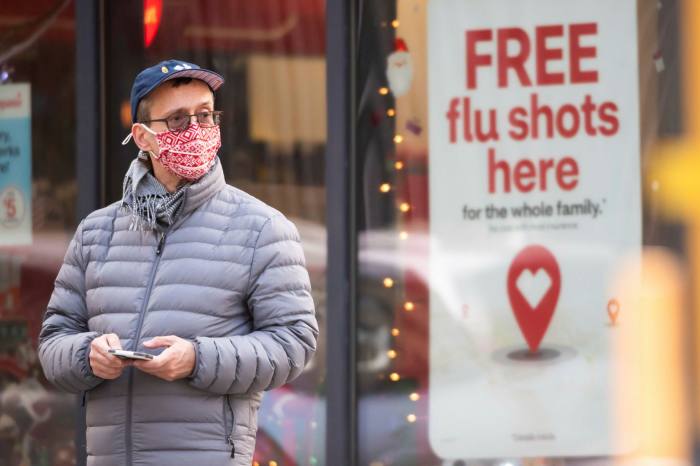Pandemic-battered health systems in Europe and the US are braced for widespread influenza outbreaks this winter, as economies reopen and coronavirus restrictions are lifted.
Lockdowns and travel curbs have almost eradicated the disease in the southern hemisphere this year but Lynnette Brammer, head of the Domestic Influenza Surveillance Team at the US Centers for Disease Control and Prevention, cautioned that “the viruses are out there — they haven’t gone away”.
She added: “It’s just a matter of ‘are they going to spread, as travel goes back somewhat more to normal? The chances of influenza activity increasing are definitely there and we’re in the period of watching to see what happens.”
Concern about the outlook is evident on the other side of the Atlantic too. Chris Whitty, chief medical adviser to the UK government, has warned that “the coming winter may well be quite a difficult one”, should the country’s taxpayer-funded health service face a “flu surge” alongside the virus and other respiratory diseases.
Epidemiologists usually look to the likes of Australia and New Zealand, where flu seasons typically peak in August, for signs of what could happen, months later, elsewhere in the world. This year, however, the country’s health department has been notified of just 417 influenza cases and not a single death.
Normally, up to 650,000 people die annually from respiratory diseases linked to seasonal flu, according to the World Health Organization — including, on average, 3,500 Australians.
Ian Barr, deputy director at the WHO’s collaborating centre for reference and research on influenza, said: “The basic story is that there’s no influenza circulating in Australia that we can detect. New Zealand hasn’t had a virus detected this year at all, to my knowledge”.
In this respect, Covid-19 has provided an unexpected boon: the same measures introduced to suppress it — citywide lockdowns, closed borders and enforced quarantines for returning citizens — have almost entirely eradicated seasonal flu in that hemisphere.
South Africa has also counted extremely few flu cases, with the country’s National Institute for Communicable Diseases uncovering just 50 cases across major regions, and no deaths, by the end of June. Experts credit a range of measures to stop Covid-19 transmission including widespread restrictions on foreign travel because of the spread of a local virus variant.

The disease has not gone entirely into retreat. The CDC’s Brammer said cases of H3N2 — part of the influenza A group most frequently associated with severe flu seasons — was circulating in Asia while China had recorded “a fair amount of activity due to influenza B”.
In Africa, the predominant virus circulating this year has been H1N1, which in 2009 caused the first pandemic in more than 40 years.
The fear now is that populations may be ill-prepared to withstand flu after such a lengthy lull. Barr said: “The longer we have seasons where there isn’t any influenza circulating, then the herd immunity levels are reduced.”
John McCauley, director of the World Influenza Centre at London’s Francis Crick Institute noted that if and when cases do rise it will have been 18 months since the last significant outbreak.
“We’re starting from a low point [of infections] but population immunity is lower. I think we’re in a position of not really being able to anticipate what will happen. You just take the measures, through increased vaccination, to keep it as low as you can,” he said.

Early signs, using serum from infected people, were that the current flu vaccine was likely to be effective against the influenza B viruses circulating in China, McCauley said.
However, it dealt with H3N2 strains “less well, which is a concern”, he added, while emphasising the vaccine had been tested only in laboratory conditions and might perform better in the real world.
Even the best flu vaccines, however, are about 60 per cent effective, compared with efficacy levels of up to 90-plus per cent for the first generation of coronavirus vaccines.
McCauley suggested novel mRNA technology, behind some of the most effective Covid-19 vaccines, might be deployed to boost flu vaccine performance in future years although considerable work would be required to develop them.
Nick Wilson, a public health professor at New Zealand’s University of Otago, said one lesson learned from the coronavirus pandemic was that “seasonal influenza is more controllable than we thought in the past”.
Doing so, however, may depend on people’s appetite to continue the social restrictions that kept Covid-19 in check. It was unclear, for example, whether societies thought it “worthwhile to require routine mask-wearing on public transport each winter and in healthcare settings”, he added.
Brammer said the CDC was closely watching how viruses were re-emerging as people began to mix in greater numbers, pointing to rising cases of Respiratory Syncytial Virus, which can be serious for young children or the elderly, in the US over the summer.
She added: “We always say influenza is very unpredictable and I think that’s never been more true than now. We could have a severe flu season, or we could have just a run-of-the-mill flu season.
“But one thing I’m confident about is that flu is going to start circulating again.”
For all the latest Business News Click Here
For the latest news and updates, follow us on Google News.
